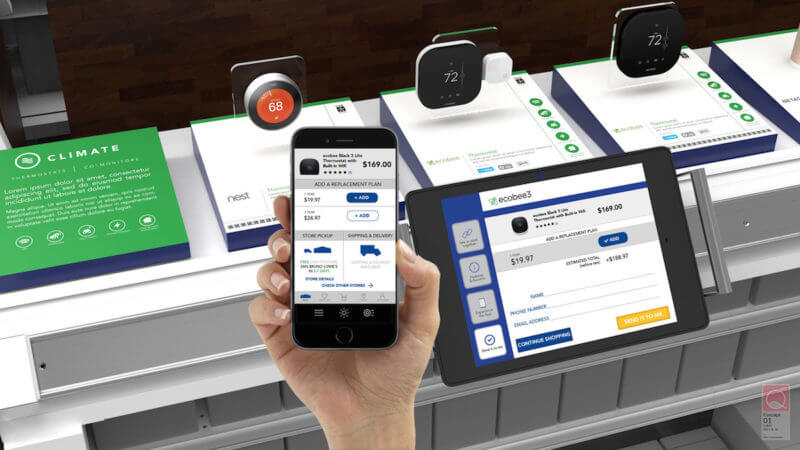The patent-pending solution reads QR codes for products in an aisle and can transmit a URL to the customer’s phone.
Retailers have been trying to bring together the information-rich world of their online stores with the touch-the-product advantages of their brick-and-mortar ones.
This had led to kiosks, mobile apps that point to inventory in a physical store, and location-based offers, among other efforts. Today, a startup is launching a new and patent-pending approach: Put a tablet on rails.
Called Converge, this is first offering from a Hayward, California-based company called June20. An iPad Pro is mounted on rails in a product aisle, and the customer can grab attached handles to move the tablet from product to product.
The back camera picks up a small QR code near the product, triggering the display of related product info on the tablet. CEO and co-founder Paul Chapuis told me there are “no blank spaces” between the QR codes, so the tablet will show either one product or the other.
The customer can select on the tablet touch screen whether the product info is, say, photos, video, tech specs or reviews. If the customer selects tech spec for the first product, for instance, the tech spec for the second product is automatically shown when the tablet is moved in front of that product, unless the user chooses another product info category.
Additionally, the customer can get the info sent to her phone via a message with a web link, by entering her phone number for a SMS or an email address into the tablet.
The info can also be sent via Bluetooth from a beacon embedded in the tablet enclosure, if the customer has the store app (or a participating app) which has utilized June20’s software development kit. The transmission will show up as a notification with a web link.
Chapuis told me that his company is developing an online dashboard that would allow retailers to upload their own product info, but currently, June20 handles the content.
Converge has been piloted over the last few months at a Home Depot in the Atlanta area and a Sam’s Club in Bentonville, Arkansas, with 15 tablets total. Chapuis said stats showing the effect on sales are not yet public, but that the average consumer interaction with the tablet is nearly 3 1/2 minutes. A significant idle time is considered the end of a given consumer session. Of course, only one customer can use each tablet at a time.
Chapuis said that this patent-pending mix of rails, QR-sensing camera and phone interaction is unique in the market. He noted that at least one competitor, B8ta, also offers an iPad Pro for product info in its own stores, but added that it is more expensive because it presents one tablet per product — instead of sharing a tablet with an entire aisle via rails.

